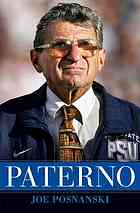
Paterno
کتاب های مرتبط
- اطلاعات
- نقد و بررسی
- دیدگاه کاربران
نقد و بررسی

September 17, 2012
Between bouts of coughing and wheezing, the late Joe Paterno told Sports Illustrated senior writer Posnanski (The Soul of Baseball), "You picked a hell of a time to write about a football coach." Indeed, the author had relocated to State College, Penn., in 2011 and was given prime access to write what was intended to be the definitive biography of this driven man. But by year's end, JoePa's legacy was overshadowed by a horrific child sexual abuse scandal involving former Nittany Lions defensive coordinator Jerry Sanduskyâa man Paterno never liked. The head coach was subsequently fired, and died a few months later. But Posnanski doesn't dwell on that last tumultuous yearâhe gives the man's life its full due: Paterno served in the Army, played football at Brown University, was named Penn State's head coach in 1966 (a deal sealed with a handshake), and went on to become one of the all-time winningest football coaches. He was praised by the press, became a fundraising dynamo, and made sure his players received a good educationâfor Paterno, college football was about "Teaching young men how to live." After the scandal broke and shortly before he died, Paterno implored Posnanskiâ an accomplished writer with an unenviable taskâto "write the truth." The author's straightforward treatment of the case might be the focus for contemporary readers, but his fair assessment of Paterno's life and illustrious career will stand the test of time. Photos.

September 15, 2012
Sensitively shaded portrait of the late Penn State football coach, an ethical man who failed to "go to the ball" when it really meant something. When former Sports Illustrated reporter Posnanski, now a senior writer for the website Sports on Earth, set out to write Paterno's biography, it looked like a dream assignment: The author would be in intimate contact with Paterno and his family, with access to his files about the Penn State football program. This book does have that intimate, backstage feel, and Posnanski tells a story no one else is ever going to get. His voice is warm, but frequently touched by melancholy, because it recounts Paterno's shattering fall from grace after Jerry Sandusky, the team's defensive coordinator, was convicted on 45 counts of child molestation. Posnanski offers a number of scenarios to contextualize Paterno's failure to investigate the allegations that led to Sandusky's conviction, most persuasively his protectiveness of the program and conviction that the problem could be dealt with in-house. Posnanski draws for readers a man who had a passion for education and saw his players as students first; Penn State athletes had a terrific graduation rate. He would pepper pep talks with Shakespeare; Virgil was his guide. "You have to listen for the divine word that tells you your destiny," Paterno said to Posnanski. The author charts the many highs and lows of a 61-year career in the voices of both friends and foes. He also traces the dwindling scope of Paterno's idealism, as the coach grew more crotchety and remote in later years. Despite Posnanski's sympathy for his Ivy-educated, Brooklyn street-fighting subject, the book never escapes from the pall of the debacle that ended Paterno's career.
COPYRIGHT(2012) Kirkus Reviews, ALL RIGHTS RESERVED.

























دیدگاه کاربران